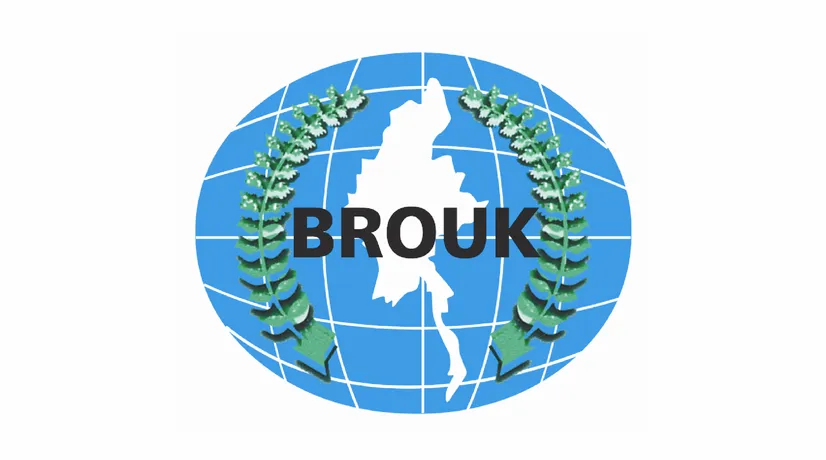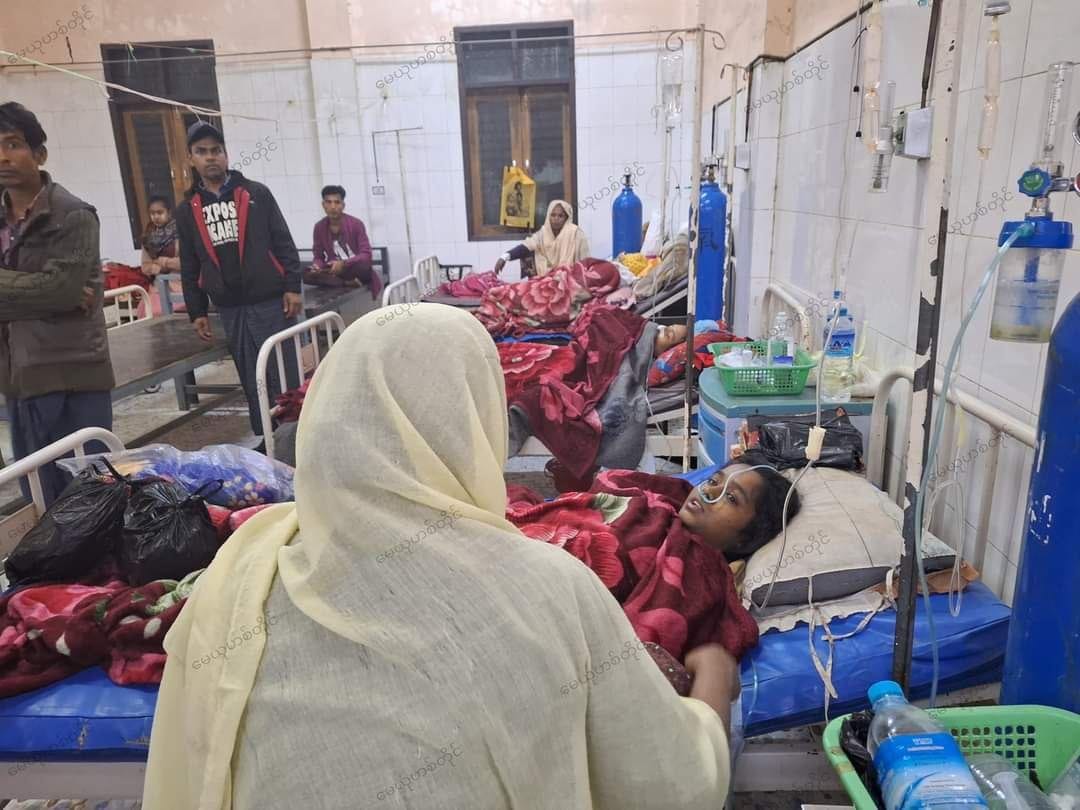Genocide Against Rohingya Is Intensifying, Warns Burmese Rohingya Organisation UK
02 April 2024


Media Release from Burmese Rohingya Organisation UK
The Burmese Rohingya Organisation UK (BROUK) today sounded the alarm, warning that the ongoing genocide against the Rohingya is intensifying. BROUK urged the UN Security Council to immediately take steps to enforce the International Court of Justice’s provisional measures order on Myanmar to protect the ‘extremely vulnerable’ Rohingya. The British government, as penholder on Myanmar at the United Nations (UN) Security Council, should urgently convene a meeting to discuss the growing crisis.
Following the resumption of hostilities in Rakhine State on 13 November last year, the junta is facing defeat by the Arakan Army (AA). The AA has already seized control of eight of Rakhine State’s 17 townships, and fierce battles are currently being waged in the northern townships of Buthidaung and Maungdaw, as well as Ann township, where the junta’s Western Regional Military Command headquarters are located.
In response, the junta has doubled-down on its decades-long strategy of divide-and-rule in the region. Struggling to fill its ranks amidst heavy losses, the army has resorted to forcibly recruiting Rohingya men and sending them to the frontlines in battle with the AA in Rakhine State.
“The regime has targeted Rohingya for forced recruitment because we are vulnerable. We cannot flee because of the restrictions on movement the junta has imposed on us – Rakhine State is like an open-air prison,” said Tun Khin, President of the Burmese Rohingya Organisation UK. “The junta views us as expendable. This is their latest heinous way to intensify the genocide against us.”
As many as 1,000 Rohingya young men – around half of them internally displaced people (IDPs) – have been forcibly recruited into the Burmese military in recent weeks. They have been abducted from their homes, villages, markets, and IDP camps and taken to military bases for military training. With merely two weeks of military training, armed, and forced to wear Burmese military uniforms, some have already been sent to the frontlines in Rakhine State. Dozens are feared to have been killed, although exact numbers are difficult to verify due to the widespread communication blackouts imposed by the regime in the region.
Other Rohingya forced recruits have been sent back to their villages and IDP camps after undergoing military training. In the Buthidaung area of northern Rakhine State, some Rohingya have been ordered to serve as militia members. Rohingya IDPs from the regional capital Sittwe who have recently returned from military training have been instructed that they will be called to the frontlines when needed. Rohingya are believed to be among the IDPs from Kyauk Ta Lone camp who have been sent to the frontline in Kyaukphyu township in recent days.
On 10 February, the regime announced it would be enforcing the 2010 Public Military Service law. BROUK emphasizes that as the regime has progressively stripped Rohingya of citizenship, leaving them without the protections and rights that citizenship bestows, there is no legal basis for their conscription. The regime itself has denied conscripting Rohingya. Referring to the Rohingya by the pejorative term ‘Bengali’, implying that they are foreign interlopers from Bangladesh, the junta decried conscription of Rohingya as ‘fake news’, stating that ‘Bengalis are not even Myanmar citizens’.
In fact, forced recruitment orders are ongoing. On 24 March, Rakhine State Minister for Security and Border Affairs Colonel Kyaw Thura summoned Rohingya village and ward administrators and IDP camp management committee leaders from more than a dozen locations in Sittwe, to insist that they comply with the orders to provide Rohingya conscripts.
Rohingya under extreme pressure
In the Rakhine State context, namely the highly coercive environment faced by the Rohingya, it is extremely difficult to refuse or resist such orders. Rohingya in village, ward, or IDP camp leadership positions have faced numerous threats to force them to comply with the orders to provide young male conscripts, including being threatened at gunpoint and detained overnight in military bases. In the Sittwe area, the regime blockaded a key road, cutting off access to markets and other IDP camps, and police besieged one of the camps for several days while they searched for Rohingya IDPs to forcibly remove for conscription.
Young Rohingya men who have been conscripted and taken to military bases for training have tried to flee. During Ramadan evening prayers, soldiers entered a mosque in an IDP camp in Sittwe and forcibly removed a group of Rohingya men who had sought refuge there. In another incident, at least three Rohingya men were severely injured in a landmine explosion when they fled military training in Sittwe.
Regime-orchestrated anti-AA ‘protests’
At the same time as being forcibly recruited into the Burmese military, Rohingya communities have been ordered to take part in anti-Arakan Army protests planned and orchestrated by the regime. The first such event took place in Buthidaung on 19 March. Footage of this orchestrated protest in Buthidaung quickly flooded social media, even though the regime had imposed a communication blackout in the area for weeks.
This coerced protest was followed by others in various Rohingya villages and neighbourhoods in Sittwe township on 21 and 23 March. The regime ordered one person from each household to attend, provided placards to participants, and arranged for pro-military media outlets to attend. This propaganda has been widely circulated by junta mouthpieces.
BROUK President Tun Khin said: “The junta’s orders to participate in anti-Arakan Army protests are extremely dangerous for Rohingya. The regime is deliberately stoking ethnic and religious tension, to incite hatred and violence towards us.”
Ongoing genocide against the Rohingya
Since January 2020, when the International Court of Justice issued its provisional measures order on Myanmar to ‘take all measures within its power’ to protect the Rohingya as part of the ongoing genocide case brought by the Gambia against Myanmar, BROUK has published eight briefings. These detail both the continual breaches of the order over the past four years, and the ongoing genocide against the 600,000 Rohingya who remain in Rakhine State.
Of particular concern is the ongoing genocidal act known as ‘slow death’, which involves deliberately inflicting conditions of life calculated to bring about the physical destruction in whole or in part of the Rohingya group. This includes the deliberate deprivation of resources indispensable for survival – namely adequate food, water, shelter, sanitation and medical care – by the military regime. The severe restrictions on freedom of movement imposed on the Rohingya underpin this act. Such restrictions also make it extremely difficult for Rohingya to flee forced recruitment, as well as military shelling and airstrikes.
“Just like in 2017, our warnings of escalating violence and cries for help are being ignored,” said BROUK President Tun Khin. “No lessons have been learnt. So far, the British government has ignored calls to convene a UN Security Council meeting to try and prevent a dramatic escalation in violence against the Rohingya.”
Tun Khin continued: “When will our voices be heard? We have said the same thing time and time again: the regime is violating the International Court of Justice’s order to protect the Rohingya. The genocide is intensifying. We urgently need action to stop it.”
For more information, please contact Tun Khin on +44 (0) 7888714866
Announcements
28 February 2025
Asian NGO Network on National Human Rights Institutions , CSO Working Group on Independent National Human Rights Institution (Burma/Myanmar)
Open letter: Removal of the membership of the dis-accredited Myanmar National Human Rights Commission from the Southeast Asia National Human Rights Institution Forum

Progressive Voice is a participatory rights-based policy research and advocacy organization rooted in civil society, that maintains strong networks and relationships with grassroots organizations and community-based organizations throughout Myanmar. It acts as a bridge to the international community and international policymakers by amplifying voices from the ground, and advocating for a rights-based policy narrative.